Growing up, we were all taught similar phrases: stop, drop, and roll when there is a fire, do not open the door for strangers, and look both ways before you cross the street. But how much of these early life lessons do we retain, and how do they affect our lives now?
Over time, the rules change slightly as we realize it is not absolutely mandatory to sing the ABCs while washing our hands or to always use your inside voice when indoors. These lessons are still in the back of our minds somewhere, but they have changed as we grow up.
As people develop, the need for strict rules lessens. That “common sense” smaller kids usually lack kicks in, and we learn that you sort of need to talk to strangers every once in a while.
“I was taught not to talk to strangers but that’s changed because right now I have to talk to strangers for my job,” said Emma Trango, a senior at LRHS. We also can distinguish what trash on the ground should be picked up or left alone or when it is okay to open the front door without notifying parents first.
“I was taught to make my bed in the morning every day because it gets my morning started and I will have already completed one thing. I try to follow that but it can be hard,” said John Duley, a sophomore at LRHS. While this is a great habit, it is another example of something that is not mandatory — although it might seem that way when we are under stricter instruction from our parents.
Teaching Kids
Especially when it comes to kids: They may not accept that they must do something just because they should. There is a constant “why” question that must always be answered.
“We tell [my son] that his vegetables and his meats are what makes his muscles grow so that’s how we get him to eat his vegetables when he doesn’t want to. Or, for example, if he bumped his knee all of a sudden his knee will hurt again when he’s tired because he doesn’t want to go to sleep and all of that, so we’ll tell him he needs to go to sleep so his body can heal and grow,” said Chaszka Mendoza, a math teacher at LRHS.
Parents establish these ideas usually for the main purpose of instilling good habits.
“I think to an extent [these things help], he learns how to take care of his body and that he needs adequate sleep to be healthy. So over time it’ll just shorten to those concepts, but right now [what we tell him] seems close enough to the truth to be helpful,” said Mendoza.
The foundations for strong values and practices are important for anyone to learn at a young age. Even if we do not do everything exactly how our parents told us, those “silly” little lessons will always be there.

Hi! My name is Gretchen and I am a senior editor and SEO editor for The Mycenaean. I love to travel and listen to music.

Leave a Reply